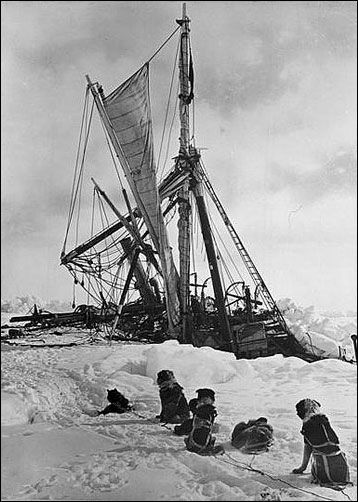Tuesday, March 07, 2006
Do You Know Shackleton?
I first heard of Ernest Shackleton in a National Geographic article. The author told of the time she was standing at a bus stop with a copy of a book about Shackleton in her hand. A man looked over, noticed the book, pointed, looked her in the eye, and said, "Shackleton." She said there was an instant connection, and she could see the earnestness in his eyes. She knew this man knew about Shackleton. And once you know his story, you're never really the same.
That article inspired me to purchase a book about Shackleton: Endurance, by Caroline Alexander*. Now I'm just finishing up Shackleton's own memoir of his experiences, South. I experienced it before, and I am experiencing it again: I can't get Shackleton out of my head. I'm full of awe, reverence, and pity for this man and his comrades.
If you don't know Shackleton, get to know him.
 A quick summary of Shackleton's story isn't enough. In 1914, he led a group of 28 men on an expedition to be the first to cross the Antarctic continent. But before they made it to land, their ship, the Endurance, became trapped in the ice. They waited months for the ice to loosen, but instead it clamped harder and harder until it crushed the ship and sank it. The men were fugitives on the ice floes in the middle of the ocean. They hiked toward land, and eventually navigated three lifeboats to the uninhabited Elephant Island. From there, Shackleton and five men took one lifeboat 800 miles across the stormiest seas in the world in the middle of winter and actually managed to hit the tiny island of South Georgia. Once there, they crossed the rugged mountains and glaciers of the island to reach a Norwegian whaling station on the other side. Eventually, they were able to rescue the other men back on Elephant Island. Although they were stranded for two years in the most inhospitable conditions conceivable, none of them died. Theirs is a story of survival, persistence, and courage. The story is too fantastic to be true, but it is.
A quick summary of Shackleton's story isn't enough. In 1914, he led a group of 28 men on an expedition to be the first to cross the Antarctic continent. But before they made it to land, their ship, the Endurance, became trapped in the ice. They waited months for the ice to loosen, but instead it clamped harder and harder until it crushed the ship and sank it. The men were fugitives on the ice floes in the middle of the ocean. They hiked toward land, and eventually navigated three lifeboats to the uninhabited Elephant Island. From there, Shackleton and five men took one lifeboat 800 miles across the stormiest seas in the world in the middle of winter and actually managed to hit the tiny island of South Georgia. Once there, they crossed the rugged mountains and glaciers of the island to reach a Norwegian whaling station on the other side. Eventually, they were able to rescue the other men back on Elephant Island. Although they were stranded for two years in the most inhospitable conditions conceivable, none of them died. Theirs is a story of survival, persistence, and courage. The story is too fantastic to be true, but it is.
But I bet you're not converted after reading that paragraph. You have to read the details about Shackleton. Read Alexander's book first, and then read South. Different details are captured in each. And it's the details that make the story so moving.
Poignant details like the day they were forced to shoot all of their sled dogs because food was running scarce. Long before, they had started eating the dog food themselves; now they ate the dogs.
Heartbreaking details like Shackleton shoving Percy Blackborow, the youngest member of the expedition, out of the boat so he could be the first man to set foot on Elephant Island. Blackborow's feet were so frostbitten he collapsed in the shallow, icy water on the beach and he just sat there.
Details that reveal a lot about human nature, like Shackleton's account of one portion of the journey from Elephant Island to South Georgia in a tiny lifeboat--called by many the greatest oceangoing feat ever accomplished. Shackleton was worried about "a small bird, unknown to me, that appeared always to be in a fussy, bustling state, quite out of keeping with the surroundings. It irritated me. It had practically no tail, and it flitted about vaguely as though in search of the lost member. I used to find myself wishing it would find its tail and have done with the silly fluttering."
When we were in England, we passed by the Royal Naval Museum. Shelly was ambivalent about going in, but I realized that there might be something about Shackleton inside. I asked the security guard, and sure enough, he directed me to a room where there was a copy of the lifeboat Shackleton made his historic voyage in (the real one is in Scotland at Shackleton's old school). That's all there was. I stood there quietly, as though on holy ground, and Shelly (who, bless her heart, does not know Shackleton) wondered what the fuss was about. But I'll remember that experience for the rest of my life.
The details are often not pleasant. But to watch these men face such challenges with courage, humor, and optimism is truly inspiring. If you don't already, get to know Shackleton.
* I think, but I'm not sure, that Alexander was the author of the National Geographic article in question.
That article inspired me to purchase a book about Shackleton: Endurance, by Caroline Alexander*. Now I'm just finishing up Shackleton's own memoir of his experiences, South. I experienced it before, and I am experiencing it again: I can't get Shackleton out of my head. I'm full of awe, reverence, and pity for this man and his comrades.
If you don't know Shackleton, get to know him.
 A quick summary of Shackleton's story isn't enough. In 1914, he led a group of 28 men on an expedition to be the first to cross the Antarctic continent. But before they made it to land, their ship, the Endurance, became trapped in the ice. They waited months for the ice to loosen, but instead it clamped harder and harder until it crushed the ship and sank it. The men were fugitives on the ice floes in the middle of the ocean. They hiked toward land, and eventually navigated three lifeboats to the uninhabited Elephant Island. From there, Shackleton and five men took one lifeboat 800 miles across the stormiest seas in the world in the middle of winter and actually managed to hit the tiny island of South Georgia. Once there, they crossed the rugged mountains and glaciers of the island to reach a Norwegian whaling station on the other side. Eventually, they were able to rescue the other men back on Elephant Island. Although they were stranded for two years in the most inhospitable conditions conceivable, none of them died. Theirs is a story of survival, persistence, and courage. The story is too fantastic to be true, but it is.
A quick summary of Shackleton's story isn't enough. In 1914, he led a group of 28 men on an expedition to be the first to cross the Antarctic continent. But before they made it to land, their ship, the Endurance, became trapped in the ice. They waited months for the ice to loosen, but instead it clamped harder and harder until it crushed the ship and sank it. The men were fugitives on the ice floes in the middle of the ocean. They hiked toward land, and eventually navigated three lifeboats to the uninhabited Elephant Island. From there, Shackleton and five men took one lifeboat 800 miles across the stormiest seas in the world in the middle of winter and actually managed to hit the tiny island of South Georgia. Once there, they crossed the rugged mountains and glaciers of the island to reach a Norwegian whaling station on the other side. Eventually, they were able to rescue the other men back on Elephant Island. Although they were stranded for two years in the most inhospitable conditions conceivable, none of them died. Theirs is a story of survival, persistence, and courage. The story is too fantastic to be true, but it is.But I bet you're not converted after reading that paragraph. You have to read the details about Shackleton. Read Alexander's book first, and then read South. Different details are captured in each. And it's the details that make the story so moving.
Poignant details like the day they were forced to shoot all of their sled dogs because food was running scarce. Long before, they had started eating the dog food themselves; now they ate the dogs.
Heartbreaking details like Shackleton shoving Percy Blackborow, the youngest member of the expedition, out of the boat so he could be the first man to set foot on Elephant Island. Blackborow's feet were so frostbitten he collapsed in the shallow, icy water on the beach and he just sat there.
Details that reveal a lot about human nature, like Shackleton's account of one portion of the journey from Elephant Island to South Georgia in a tiny lifeboat--called by many the greatest oceangoing feat ever accomplished. Shackleton was worried about "a small bird, unknown to me, that appeared always to be in a fussy, bustling state, quite out of keeping with the surroundings. It irritated me. It had practically no tail, and it flitted about vaguely as though in search of the lost member. I used to find myself wishing it would find its tail and have done with the silly fluttering."
When we were in England, we passed by the Royal Naval Museum. Shelly was ambivalent about going in, but I realized that there might be something about Shackleton inside. I asked the security guard, and sure enough, he directed me to a room where there was a copy of the lifeboat Shackleton made his historic voyage in (the real one is in Scotland at Shackleton's old school). That's all there was. I stood there quietly, as though on holy ground, and Shelly (who, bless her heart, does not know Shackleton) wondered what the fuss was about. But I'll remember that experience for the rest of my life.
The details are often not pleasant. But to watch these men face such challenges with courage, humor, and optimism is truly inspiring. If you don't already, get to know Shackleton.
* I think, but I'm not sure, that Alexander was the author of the National Geographic article in question.
Comments:
Oh, and for those of you who can't be bothered with too many details, there are a couple of non-theatrical movies on the topic. I've seen a straight out documentary and an adaptation starring Kenneth Branagh as Shackleton (the two actually have remarkably similar faces) produced by A&E. Good, but not as good as the books.
Post a Comment








